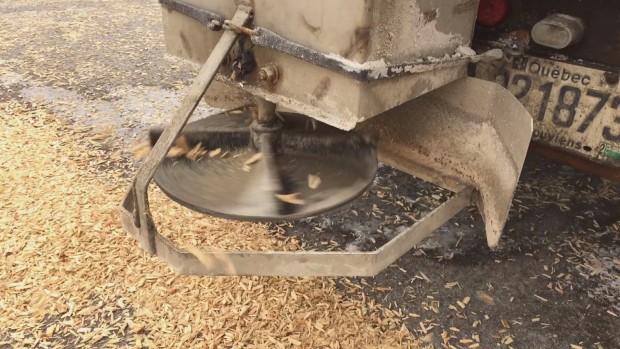A couple of new tree technology items..
From Quebec here.
The town of Rosemère, Que., is opting for a more environmentally-friendly way of keeping roads from becoming slippery due to ice, snow and freezing rain — it’s using wood chips.
The town, located just northwest of Laval, is testing out wood chips as a replacement for salt or gravel on the roads.
Rosemère Mayor Eric Westram said they are ditching the “old, conventional way” in favour or something more eco-friendly and more efficient.
“All this salt and all those materials end up in the river,” said Westram. “So if you want to be conscientious of the environment, you have to look at other alternatives.”
He said it all began when a public works employee attended a conference on snow clearing and came back with the idea to try out the wood chips on a couple of key streets that are known in the area for becoming icy.
Westram said the wood chips are completely biodegradable and that they can help vehicles maintain traction in –30 C, compared with salt which he says works up to –15 C.
”Wood is as natural as it comes,” he told CBC. “This is definitely the thing of the future.” The plan to use wood chips is beginning as a pilot project on a few key streets. Since the wood chips don’t disintegrate, the city has to treat the streets much less often.
Aside.. I’ve noticed in my relatively steep driveway that if I rake pine needles along one side, it keeps ice sheets from forming and makes them easier to crack, quicker to melt and safer to walk on.
This one’s more obscure but also interesting from New Scientist here..
Northern China has a smoky problem caused by autumn leaves, but now there could be a fix: simply turn them into devices that store energy.
Many roads in this part of China are lined with trees of the genus Paulownia, sometimes called phoenix trees. Despite the government’s disapproval, many locals burn the fallen leaves, worsening the country’s notorious air pollution. In Beijing alone, about 2 million tonnes of leaves and other plant waste are burned every year.
Now, Hongfang Ma at the Qilu University of Technology in Jinan and her colleagues have figured out how to turn phoenix tree leaves into organic capacitors. These could be used like batteries to store energy, potentially avoiding some of that air pollution into the bargain.
The process of making organic capacitors does release a little carbon dioxide, but not nearly as much as would be emitted if you let the same quantity of material burn or decay, says Caroline Burgess Clifford at Penn State University. “Any type of use of any waste material is a good thing.”
